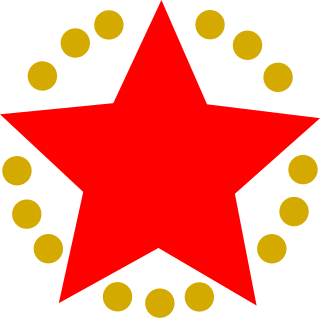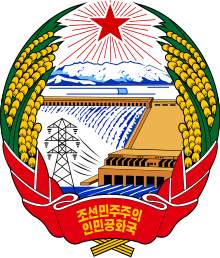
The general secretary of the Workers' Party of Korea is the head of the Workers' Party of Korea, the ruling party in North Korea, and considered as the supreme leader of North Korea. The general secretary is the chairman of the Central Military Commission of the Workers' Party of Korea, as well as a member of the Politburo Presidium, the Politburo and the Secretariat.

The 6th Central Committee of the Workers' Party of Korea was elected by the 6th Congress on 14 October 1980, and remained in session until the election of the 7th Central Committee on 9 May 2016. The Central Committee composition was replenished by the 3rd WPK Conference. In between party congresses and specially convened conferences the Central Committee is the highest decision-making institution in the WPK and North Korea. The Central Committee is not a permanent institution and delegates day-to-day work to elected bodies, such as the Presidium, the Politburo, the Secretariat, the Central Military Commission and the Control Commission in the case of the 6th Central Committee. It convenes meetings, known as "Plenary Session of the [term] Central Committee", to discuss major policies. Only full members have the right to vote, but if a full member cannot attend a plenary session, the person's spot is taken over by an alternate. Plenary session can also be attended by non-members, such meetings are known as "Enlarged Plenary Session", to participate in the committee's discussions.

The 1st Central Committee of the Workers' Party of North Korea (WPNK) was elected by the 1st Congress on 30 August 1946 through the merger of the Communist Party of North Korea and the New People's Party of Korea, and remained in session until the election of the 2nd Central Committee on 30 March 1948. In between party congresses and specially convened conferences the Central Committee is the highest decision-making institution in the party and North Korea. The 1st Central Committee was not a permanent institution and delegated day-to-day work to elected central guidance bodies, such as the Political Committee, the Standing Committee and the Organisation Committee. It convened meetings, known as Plenary Sessions of the 1st Central Committee, to discuss major policies. A plenary session could be attended by non-members. These meetings are known as Enlarged Plenary Sessions. The party rules approved at the 1st Congress stipulated that the Central Committee needed to convene for a plenary session every third month. In total, the 1st Central Committee convened for twelve plenary sessions, of which eight were convened in 1947.

The 2nd Central Committee of the Workers' Party of Korea (WPK) was elected at the 2nd Congress on 30 March 1948, and remained in session until the election of the 3rd Central Committee on 29 April 1956. In between party congresses and specially convened conferences the Central Committee is the highest decision-making institution in the WPK and North Korea. The 2nd Central Committee was not a permanent institution and delegated day-to-day work to elected bodies, such as the Political Committee, the Standing Committee, the Organisation Committee and the Inspection Committee in this case. It convened meetings, known as "Plenary Session of the [term] Central Committee", to discuss major policies. Only full members had the right to vote, but if a full member could not attend a plenary session, the person's spot was taken over by an alternate. Plenary session could also be attended by non-members, such meetings are known as "Enlarged Plenary Session", to participate in the committee's discussions. During its tenure it held five plenary sessions, one enlarged session, seven joint plenary sessions and four stand-alone plenums.

The Chairman and Vice Chairman of the Workers’ Party of Korea (WPK) were offices that existed within the WPK between 1949–66 and 2016–21. The office of "Chairman of the Central Committee" existed between 1949–66 and the office of "Chairman of the Workers' Party of Korea" existed in 2016–21. The deputy to the Chairman, the officeholder of Vice Chairman of the Central Committee existed in 1949–66 and 2016–21. This list also includes the chairmen and vice chairmen of the direct predecessors of the WPK.

The 3rd Central Committee of the Workers' Party of Korea (WPK) was elected at the 3rd Congress on 29 April 1956, and remained in session until the election of the 4th Central Committee on 18 September 1961. In between party congresses and specially convened conferences the Central Committee is the highest decision-making institution in the WPK and North Korea. The Central Committee is not a permanent institution and delegates day-to-day work to elected bodies, such as the Standing Committee, the Organisation Committee and the Inspection Committee in the case of the 3rd Central Committee. It convenes meetings, known as "[month] Plenary Session of the Central Committee", to discuss major policies. Only full members have the right to vote, but if a full member cannot attend a plenary session, the person's spot is taken over by an alternate. Plenary session can also be attended by non-members, such meetings are known as "Enlarged Plenary Session", to participate in the committee's discussions.

The 4th Central Committee of the Workers' Party of Korea (WPK) was elected at the 4th Congress on 18 September 1961. and remained in session until the election of the 5th Central Committee on 13 November 1970. In between party congresses and specially convened conferences the Central Committee is the highest decision-making institution in the WPK and North Korea. The Central Committee is not a permanent institution and delegates day-to-day work to elected bodies, such as the Political Committee, the Secretariat and the Inspection Committee in the case of the 4th Central Committee. It convenes meetings, known as "Plenary Session of the [term] Central Committee", to discuss major policies. Only full members have the right to vote, but if a full member cannot attend a plenary session, the person's spot is taken over by an alternate. Plenary session can also be attended by non-members, such meetings are known as "Enlarged Plenary Session", to participate in the committee's discussions.
The 2nd Political Committee of the Workers' Party of Korea (WPK), officially the Political Committee of the 2nd Central Committee (2nd CC), was elected in the immediate aftermath of the 2nd WPK Congress on 30 March 1948 by the 2nd CC's 1st Plenary Session. The composition changed on the merger of the Workers' Party of North Korea and the Workers' Party of South Korea (WPSK) on 24 June 1953, and was again changed after a purge of WPSK-affiliated communists on 6 August 1953.
The 3rd Central Auditing Committee (CAC) of the Workers' Party of Korea (WPK), officially the Central Auditing Committee of the 3rd Congress of the Workers' Party of Korea, was elected by the 3rd Congress on 29 April 1956.
The 3rd Standing Committee of the Workers' Party of Korea (WPK),(3차 조선로동당 상임위원회) officially the Standing Committee of the 3rd Congress of the Workers' Party of Korea, was elected by the 1st Plenary Session of the 3rd Central Committee on 29 April 1956.

The 2nd Standing Committee of the Supreme People's Assembly (SPA) was elected by the 1st Session of the 2nd Supreme People's Assembly on 20 September 1957. It was replaced on 23 October 1962 by the 3rd SPA Standing Committee.

The 3rd Standing Committee of the Supreme People's Assembly (SPA) was elected by the 1st Session of the 3rd Supreme People's Assembly on 23 October 1962. It was replaced on 16 December 1967 by the 4th SPA Standing Committee.

The Committees of the 2nd Supreme People's Assembly (SPA) was elected by the 1st Session of the 2nd Supreme People's Assembly on 20 September 1957. It was replaced on 23 October 1962 by the committees of the 3rd Supreme People's Assembly.

The committees of the 3rd Supreme People's Assembly (SPA) were elected by the 1st Session of the aforementioned body on 23 October 1962. It was replaced on 16 December 1967 by the committees of the 4th Supreme People's Assembly.

The 1st Cabinet of North Korea was elected by the 1st Session of the 1st Supreme People's Assembly on 9 September 1948. It was replaced on 20 September 1957 by the 2nd Cabinet.

The 2nd Cabinet of North Korea was elected by the 1st Session of the 2nd Supreme People's Assembly on 20 September 1957. It was replaced on 23 October 1962 by the 3rd Cabinet.

The 4th Cabinet of North Korea was elected by the 1st Session of the 4th Supreme People's Assembly on 16 December 1967. It was replaced on 26 December 1972 by the 5th Administrative Council.

The 2nd Supreme People's Assembly (SPA) in North Korea was elected on 27 August 1957 and convened for its first session on 18–20 September 1957. It was replaced on 23 October 1962 by the 3rd Supreme People's Assembly.

The 3rd Supreme People's Assembly (SPA) was elected on 8 October 1962 and convened for its first session on 22–23 October 1962. It was replaced on 16 December 1967, by the 4th Supreme People's Assembly.
Choe Yong-jin (Korean: 최용진 was a North Korean politician and general. He belongs to the Manchu faction. He served as Vice Premier of North Korea







